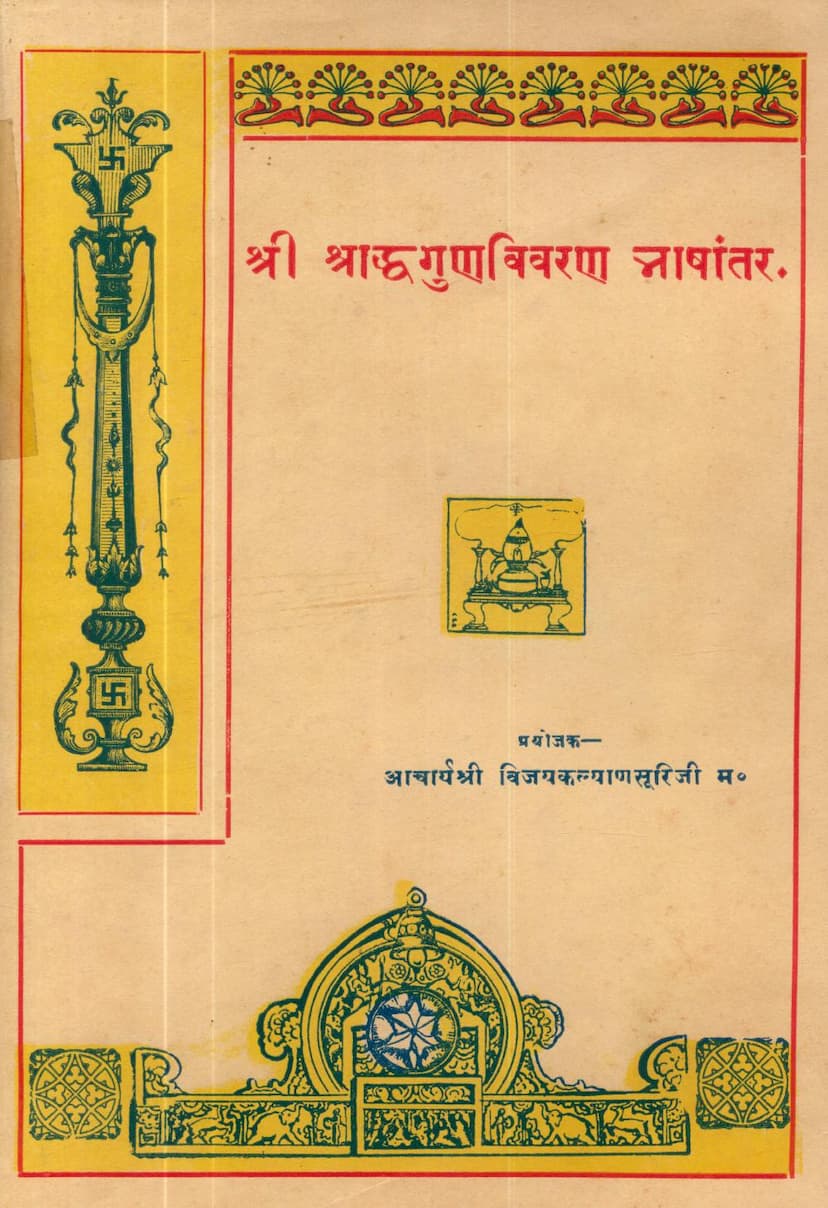Shraddhagun Vivaran Bhashantar
Added to library: September 2, 2025

Summary
Here's a comprehensive summary of the Jain text "Shraddhagun Vivaran Bhashantar" based on the provided pages:
Book Title: Shraddhagun Vivaran Bhashantar (Explanation of the Virtues of a Lay Disciple) Author(s): Jinmandangani, Chaturvijay, Vijaykalyansuri Publisher: Vijaynitisuri Jain Library Catalog Link: https://jainqq.org/explore/023452/1
Overall Purpose and Content:
This book, "Shraddhagun Vivaran Bhashantar," is a commentary and translation of the original work by Paramarshi Shrimad Jinmandanganigan. It aims to provide a detailed and illustrative explanation of the virtues of a 'Shrāvak' (a devout lay follower in Jainism). The text emphasizes the importance of developing these virtues for achieving spiritual progress and fulfilling one's duties as a householder. It is presented as a guide for lay Jains to understand and practice their dharma effectively.
Key Themes and Structure:
The book is structured around a detailed exposition of thirty-five virtues (गुण) that are essential for a model lay disciple. The introduction and preface highlight the relevance of these virtues in contemporary times, especially for those seeking to lead a morally upright and spiritually inclined life within the framework of household responsibilities.
Core Concepts Explained:
-
Definition of a Shrāvak: The text begins by defining a Shrāvak (lay disciple) through various interpretations of the word itself, emphasizing qualities like faith, listening to the teachings, charitable spending, adherence to right faith (Samyaktva), conquering sins, and controlling the senses.
-
The Importance of Virtues: It's argued that virtues are the means to attain the ultimate goal of life and to understand the true nature of the soul. The human birth is considered a precious opportunity to cultivate these virtues, which are dormant seeds within every being, activated by effort and right guidance.
-
The Thirty-Five Virtues (A Glimpse): The book systematically details each of the thirty-five virtues, often accompanied by illustrative stories and examples from Jain scriptures and history to make the concepts relatable and impactful. While a full enumeration of all 35 is extensive, the summary of the table of contents and the introductory sections reveals the breadth of topics covered:
- Ethical Conduct: Honesty in dealings (न्यायसंपन्नविभव), good manners (शिष्टाचार), avoiding slander (अवर्णवाद), truthfulness, integrity, respecting elders, and following societal norms (देशाचार).
- Family and Social Life: Proper conduct in marriage (समानकुल), raising virtuous children, respecting parents, choosing good neighbors and companions (सत्सग), and maintaining harmonious relationships.
- Personal Discipline: Fear of sin (पापभीरु), controlling desires, practicing moderation in expenses, appropriate attire, cultivating wisdom, listening to religious discourse, mindful eating habits (abstaining from food when undigested), practicing the three aims of life (Dharma, Artha, Kama), respecting guests (अतिथिसंस्कार), avoiding false attachments and biases, understanding one's own and others' strengths and weaknesses, serving elders and the needy, foresight, expertise, gratitude, popularity, modesty, compassion, gentleness, generosity, and controlling internal enemies like lust, anger, greed, ego, attachment, and joy.
- Spiritual Practice: Regular listening to religious discourses (धर्मश्रवण), understanding scriptures, and ultimately progressing towards spiritual liberation.
-
Illustrative Narratives: The book relies heavily on stories (e.g., about Vimal, Dhanashreshthi, Ambika, Vimal and Sahadev, King Jitarin, King Vikram, Vasantpur's Jinadatt, Sagar Sheth, and Bharata Raja) to explain the practical application and consequences of possessing or lacking these virtues. These narratives serve as moral lessons, reinforcing the teachings.
-
Guidance for Householders: The text is particularly aimed at householders, providing them with a roadmap to integrate spiritual practices with worldly responsibilities, thereby achieving both material well-being and spiritual advancement. It emphasizes that household dharma is simpler and more achievable than monastic dharma.
-
Commentary and Translation: The title "Bhashantar" indicates that this is a translation and commentary on the original work, making it accessible to a wider audience. The effort of the translators and editors is acknowledged, highlighting their dedication to making this valuable knowledge available.
Key Figures:
- Paramarshi Jinmandanganigan: The original author whose profound work on the virtues of a lay disciple is being explained.
- Acharya Shri Vijaykalyansuri Maharaj: The inspiration and supervisor for this edition.
- Munishri Chaturvijayji Maharaj: The translator and commentator, a disciple of Acharya Shri Kantivijayji Maharaj.
- Shri Vijaynitisurishwarji Jain Library: The publisher, based in Ahmedabad.
- Sheth Samchand Sankalchand: A notable individual whose life and contributions are briefly mentioned, highlighting his devout nature and support for religious activities.
Overall Message:
"Shraddhagun Vivaran Bhashantar" is a comprehensive manual for Jain lay followers, offering a detailed, illustrated, and practical guide to living a virtuous life. It underscores that by cultivating these thirty-five virtues, an individual can attain happiness in this life and pave the way for spiritual liberation in the hereafter. The book advocates for a balanced approach to life, integrating dharma with worldly affairs, and emphasizes the power of good conduct, ethical living, and devotion in achieving both individual and societal well-being.